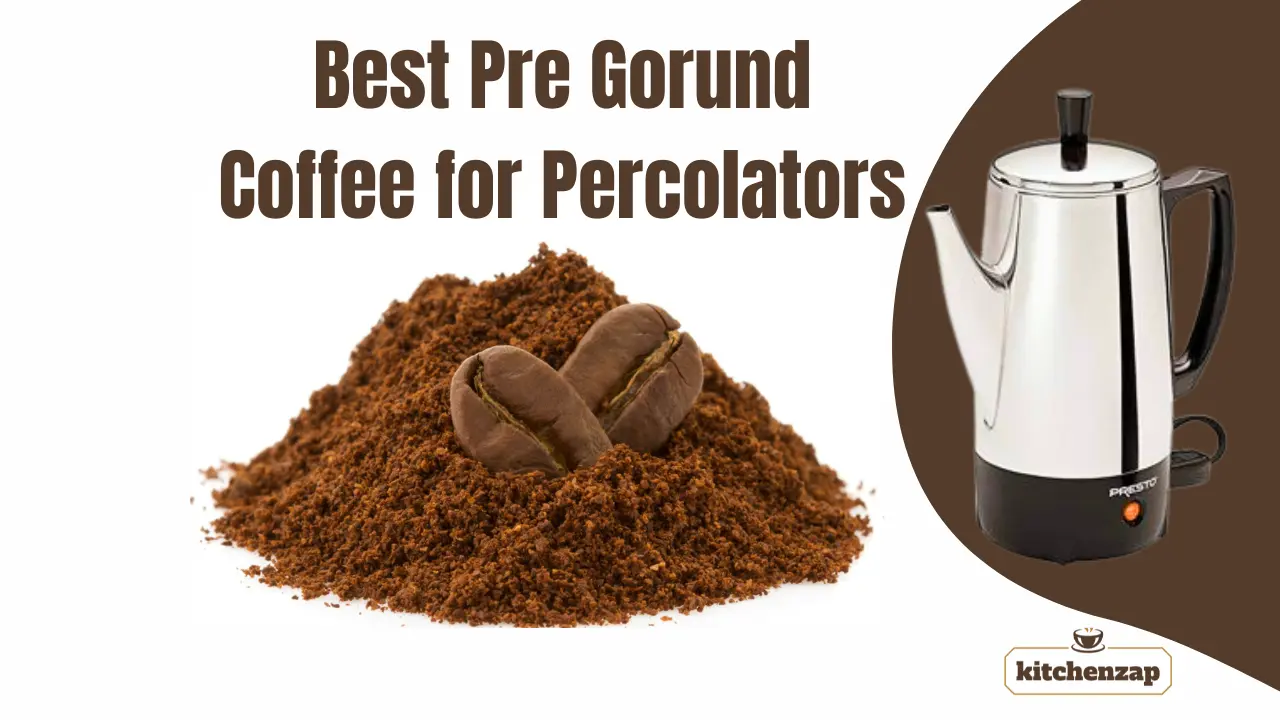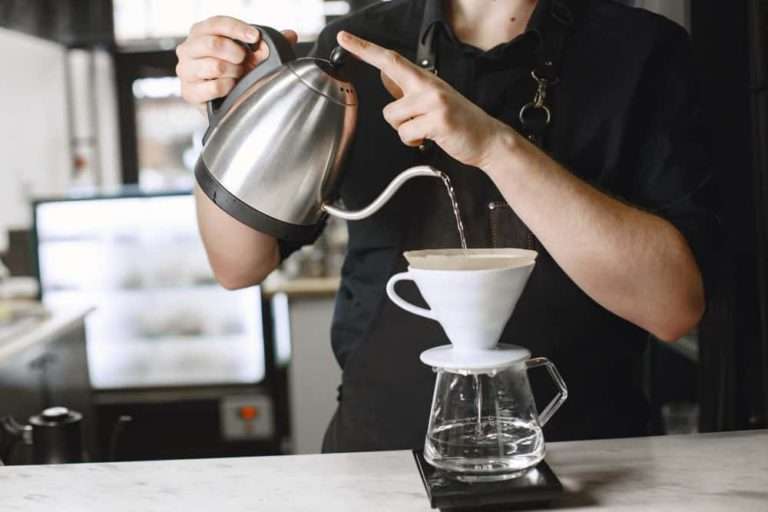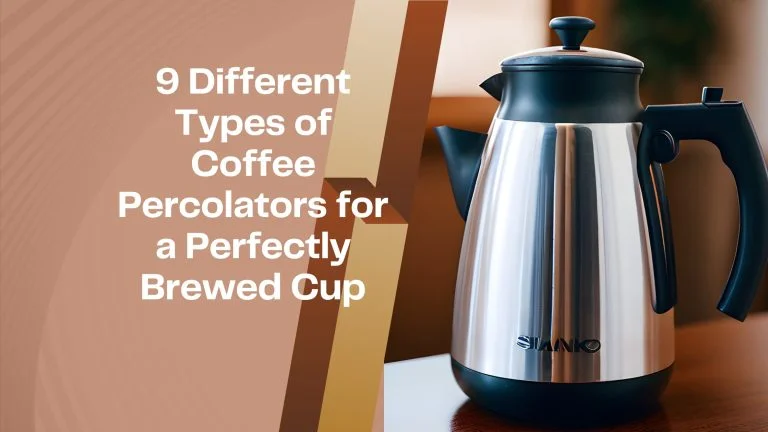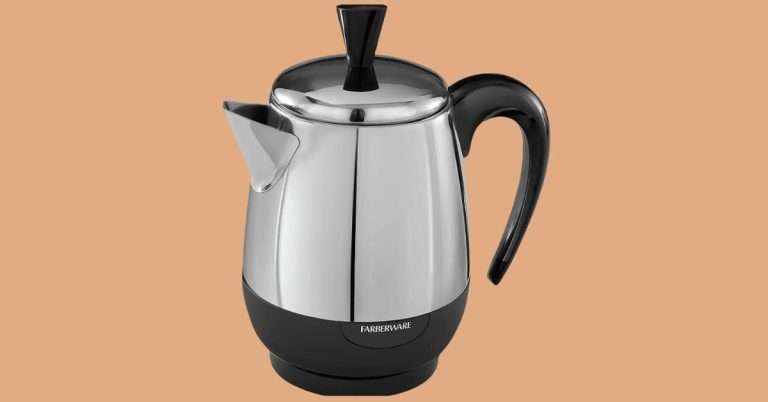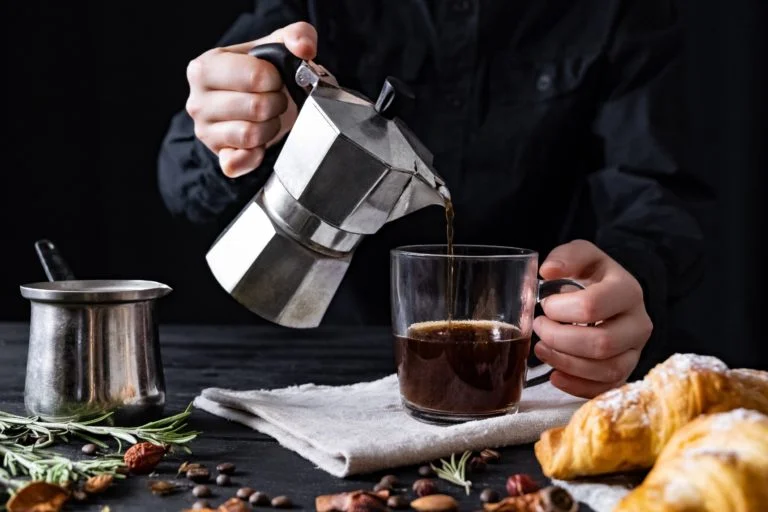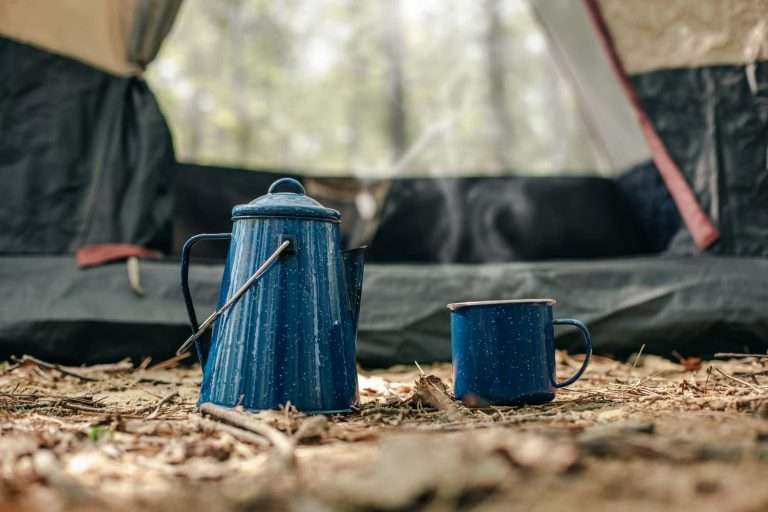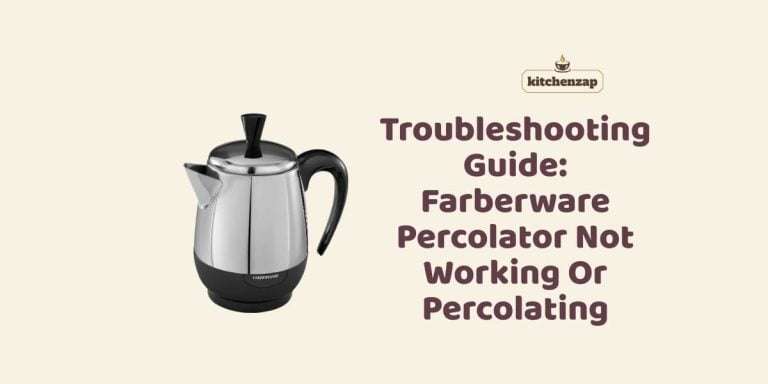Elevate Your Morning Ritual: The Best Pre-Ground Coffee for Percolators Unveiled
The best pre-ground coffee for percolators is a medium to coarse grind. This grind size allows for optimal extraction and flavor without the grounds passing through the filter or clogging the percolator basket.
Coarser grinds provide more surface area for efficient extraction while preventing over-extraction and bitterness during the percolation process.
Key Takeaways
- Choose a coarse ground coffee specifically made for percolators to allow proper water circulation and prevent over extraction.
- Prioritize freshness – check roast dates and use pre-ground coffee within a few weeks for optimal flavor.
- Look for Dark Roast blends as they suit the percolation method best with their bolder, richer flavor notes.
- Evaluate ethical and sustainability factors – Fair Trade, Organic, eco-friendly processes show care for people and planet.
- Dial in right measurements – 2 tbsp ground coffee per 6 oz water is a good starting ratio to tweak to taste.
- Allow proper brew time, 7-10 mins depending on roast style – don’t let coffee boil or reheat for best results.
- Keep the percolator well-maintained through regular cleaning and replacement of worn parts.
- When buying pre-ground percolator coffee, favor specialty roasters or high-end grocers for freshness and availability of coarse grinds.
Characteristics of the Best Pre-Ground Coffee for Percolators
1. Perfect Grind Size
- Percolators need coarse ground coffee. Why? It stops coffee bits from getting in your cup. Also, it makes sure the water can mix well with the coffee when brewing. This way, your coffee tastes just right!
2. Freshness and Packaging
- Fresh coffee is the best! Look for packages that keep air out. Why? Because air makes coffee lose its great taste. A good package keeps your coffee fresh until you brew it.
3. Roast Types for Percolation
- Medium and dark roasts are great for percolators. They give a rich flavor that’s perfect for this brewing style. Light roasts? Not so much. They are better for other brewing methods. So, choose a roast that matches your taste and works well in a percolator.
No products found.
Factors to Consider When Choosing Pre-Ground Coffee for Percolator
1. Bean Origin and Blend
- Where your coffee comes from matters. Different places have unique soil and climate. This affects the taste. Some beans are fruity, others are nutty or spicy. Think about what flavors you like.
- Blends mix beans from different places. This can make the taste even better. Single-origin coffee is from one place. It lets you enjoy a distinct flavor.
2. Roast Date and Shelf Life
- Freshness is key for good coffee. Check the roast date. The closer to brewing, the better.
- Coffee doesn’t stay good forever. Even in a sealed bag, it loses flavor over time. Try to use it within a few weeks of the roast date.
3. Ethical and Sustainable Sourcing
- Coffee should be good for you and the planet. Some brands care a lot about this.
- Look for fair trade labels. They mean the farmers get paid well.
- Organic labels show the coffee was grown without harmful chemicals.
- Some brands also help the environment or the communities where they get their beans. Supporting these brands can make a big difference.
4. Origin and Processing Method
- Where the coffee is grown and how it’s processed after harvest significantly impacts flavor.
- Coffee grown in volcanic soil often has a bright, vibrant quality while island coffees take on more fruity notes.
- How the bean is dried also makes a difference – “natural” or “honey” processed beans dried inside the fruit tend to be fruitier versus washed beans cleaned of fruit residue first.
5. Altitude
- Higher elevations produce denser beans thanks to cooler temperatures, extending growing times.
- This can mean a more intense flavor. Coffees grown over 1500m are considered “Strictly High Grown”, the highest quality grade.
6. Ethical and Environmental Considerations
- Supporting responsible coffee brands matters both for farmer livelihoods and sustainability.
- Fair Trade certification indicates farmers receive fair wages, able to cover production costs and living expenses.
- Organic farming prohibits chemicals, preserving water and soil. Eco-conscious processes like water recycling in processing mills and minimal packaging waste further reduce overall environmental impact.
- Choosing coffees based on ethics and sustainability makes the entire supply chain healthier – from crop to cup.
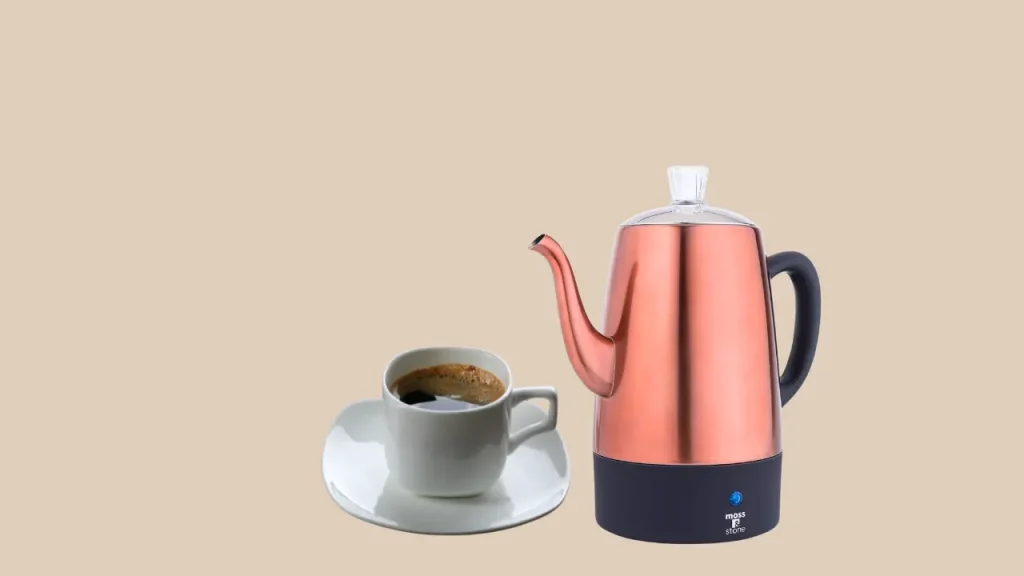
Top Recommended Pre-Ground Coffee for Percolators
Highly-rated, widely available brands:
- Maxwell House Original Roast: Affordable, consistent, medium-bodied with a hint of nuttiness. Its dark roast stands up well to percolators.
- Folgers Classic Roast: Budget-friendly, smooth, balanced flavor with a touch of nuttiness. Dark roast suitable for percolators.
No products found.
- Eight O’Clock Coffee Original Blend: Rich and satisfying, medium-dark roast with hints of chocolate and caramel. Bold flavor works well in percolators.
- Dunkin’ Donuts Original Blend: Familiar Dunkin’ taste, smooth, slightly sweet, medium roast.
Specialty brands with good reviews:
- Death Wish Coffee: Ultra-strong dark roast for serious caffeine cravings. Note its potency before trying.
- Kicking Horse Coffee Three Sisters: Smooth, complex blend with chocolate, caramel, and cherry notes. Medium roast is good for percolators.
No products found.
- Cafe Las Flores Grandes Cosechas: Fair-trade, organic, full-bodied with no bitterness. Dark roast pairs well with percolators.
- Volcanica Guatemala Antigua: Single-origin, brighter, more delicate with citrus, chocolate, and spice notes. Medium roast for percolators.
Best Coarse Ground Coffee for Percolator
- Medium-roast blends: These are versatile and tend to be less acidic than darker roasts. Look for blends specifically made for percolators, or try a medium-grind French press blend.
- Sumatra or Java coffees: These Indonesian coffees have an earthy, rich flavor that stands up well to the brewing process in a percolator.
No products found.
- Guatemalan coffees: These coffees are known for their bright acidity and complex flavor profile. Choose a medium roast to avoid excessive bitterness.
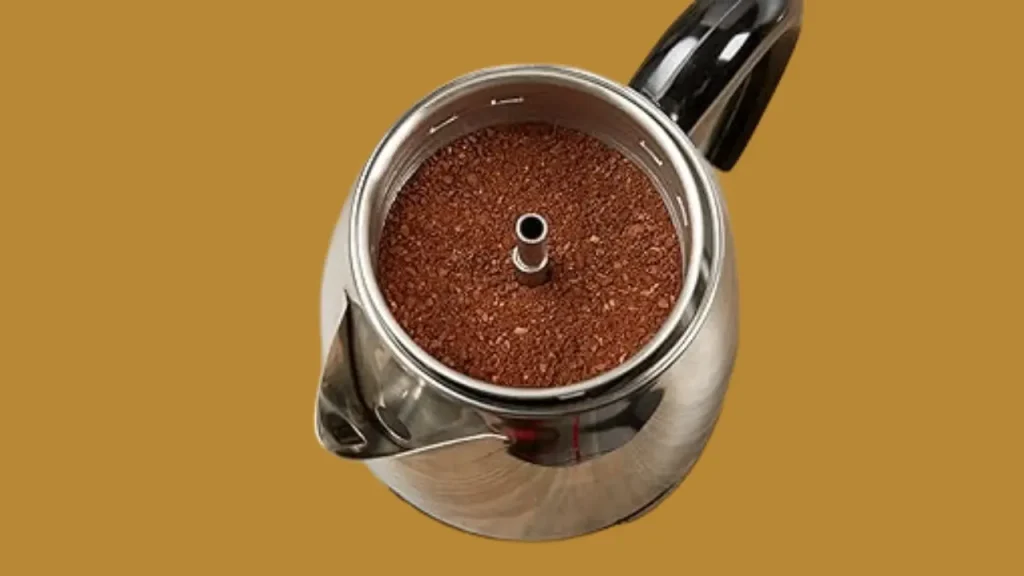
Brewing Tips for the Perfect Cup with a Percolator
Step-by-Step Guide on Brewing
- Add Water: Fill the percolator with cold, fresh water up to the mark for the number of cups you want.
- Add Coffee: Put coarse ground coffee in the basket. A good rule is one tablespoon per cup.
- Assemble and Heat: Put the basket in the percolator. Close the lid. Heat it until it starts percolating.
- Let it Brew: Let it percolate for about 7 to 10 minutes. Watch the clear knob on top to judge the coffee’s color.
- Ready to Serve: Once it’s dark enough, remove it from the heat. Take the basket out carefully to avoid grounds in your coffee.
Tips on Water Quality, Quantity, and Temperature
- Quality: Use clean, fresh water. Tap water can be fine, but filtered or bottled water might taste better.
- Quantity: Follow your percolator’s guide. Too much water dilutes the coffee. Too little makes it too strong.
- Temperature: Don’t let the coffee boil. It should just percolate. This keeps the taste smooth.
Maintenance Tips for Your Percolator
- Clean After Use: Ensure to rinse your coffee percolator with hot water after every use to maintain its best condition. For a more thorough cleaning, consider following our comprehensive guide on how to clean a coffee percolator, where we recommend a deep cleaning routine every few weeks using a mix of water and vinegar to effectively remove any buildup.
- Check for Damage: Look at the parts. If something’s broken or worn out, replace it.
- Store Properly: Keep it dry and clean when not in use. This stops mold and keeps it ready for your next brew.
FAQs
Can I use any pre-ground coffee in my percolator?
Not exactly. It’s best to choose a coarse-ground, dark roast coffee specifically designed for percolators. Fine grinds can clog the percolator and create bitter-tasting coffee.
Does the brand of pre-ground coffee matter?
Yes, some brands prioritize higher quality beans and more consistent grinds. Look for brands known for their freshness, quality sourcing, and percolator-specific blends.
What are some popular origins for percolator coffee?
Latin American coffees like Colombian or Brazilian offer balanced flavor profiles, while African coffees like Ethiopian or Kenyan bring brighter, fruitier notes. Sumatra coffees offer an earthy, bold taste.
Does pre-ground coffee go bad faster than whole beans?
Yes, the larger surface area of ground coffee leads to quicker oxidation and loss of flavor. Choose small packages or buy frequently for optimal freshness.
Can I use flavored pre-ground coffee in my percolator?
Sure, but be aware that the strong flavors can overpower the delicate notes of the coffee itself. Choose high-quality flavors and don’t overdo it.
Is there a difference between pre-ground coffee for drip coffee and percolators?
Yes, percolator coffee needs a coarser grind to avoid over-extraction and bitterness. Opt for grinds labeled specifically for percolators or French press.
How much pre-ground coffee should I use for my percolator?
It depends on your pot size and desired strength. Start with a standard ratio of 1-2 tablespoons per 6 ounces of water, and adjust based on taste.
Can I use a paper filter with pre-ground coffee in my percolator?
It depends on your percolator. Some have built-in filters, while others benefit from additional filtration to prevent sediment. Experiment and see what works best for you.
How can I tell if my pre-ground coffee is too old?
Look for signs of staleness like dull aroma, weak flavor, and bitterness. If you’re unsure, it’s better to buy fresh coffee.

